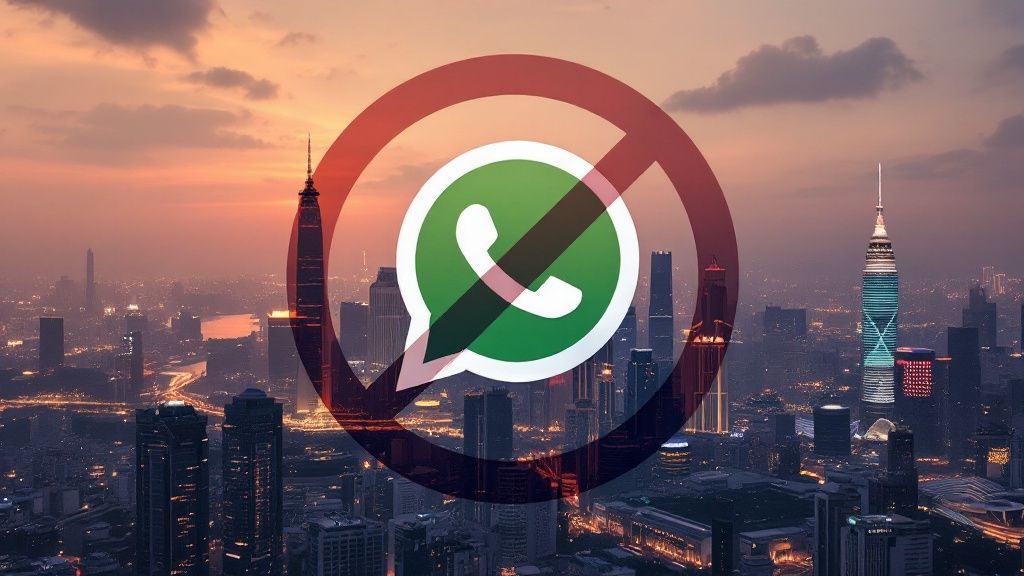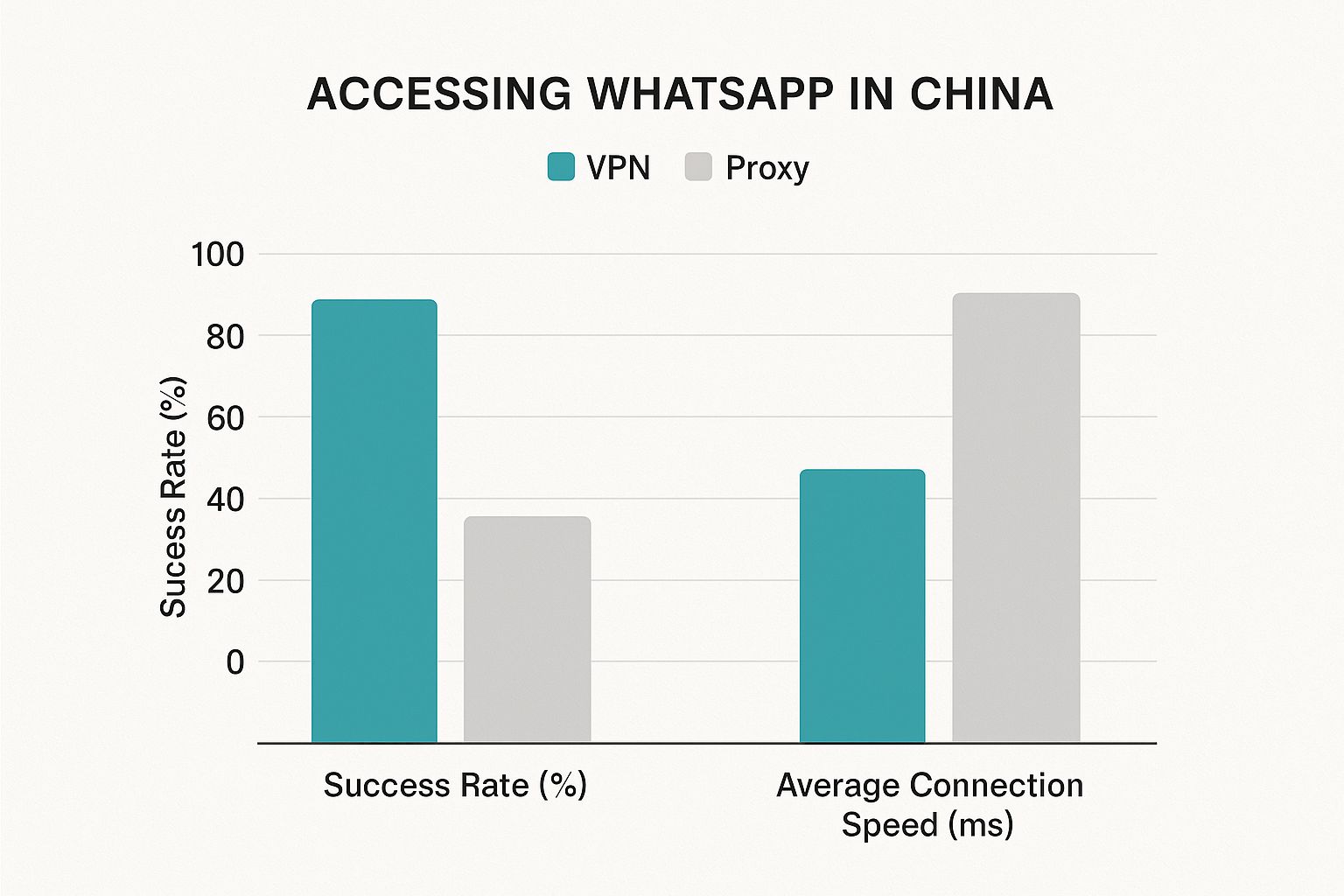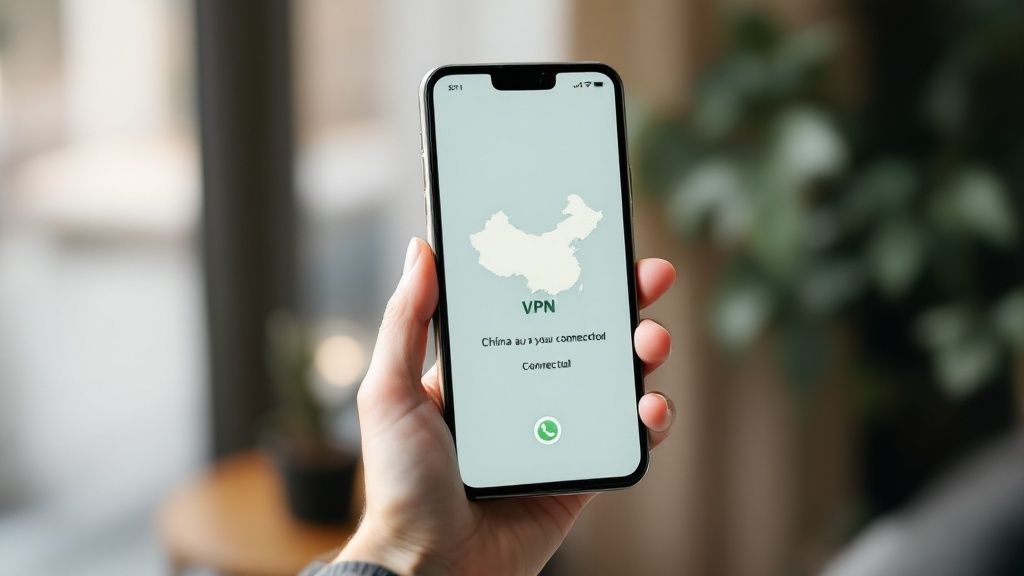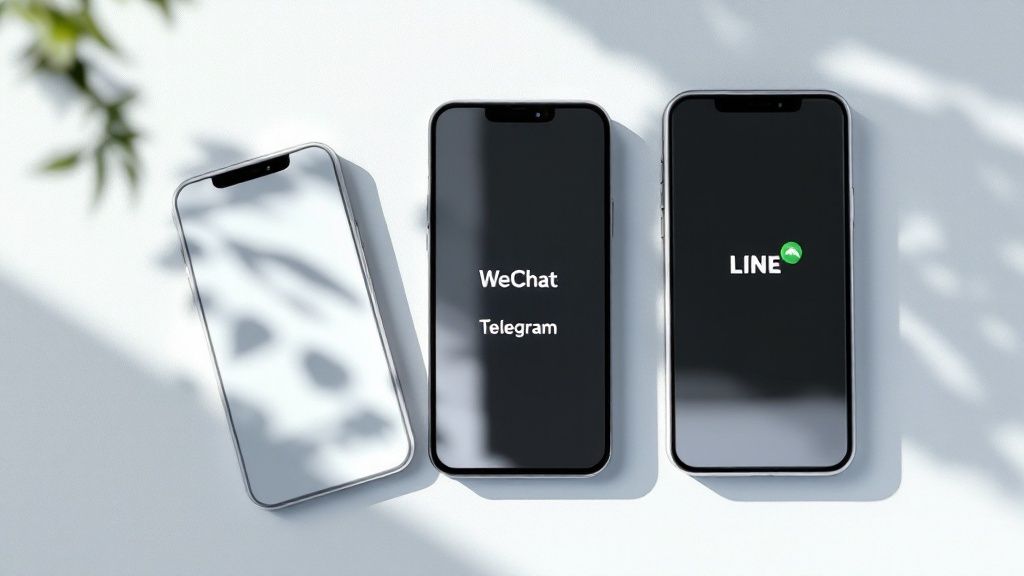Let's get straight to it: WhatsApp does not work in China. At least, not on its own.
The moment you land, connect to the airport Wi-Fi, or pop in a local SIM card, you’ll find the app completely firewalled. No messages, no calls, no status updates. It's totally blocked by the country's sophisticated internet filtering system, widely known as the Great Firewall.
Understanding WhatsApp's Status in China
For any traveller, suddenly realising WhatsApp is blocked can feel like your main line to friends, family, and even work has been abruptly cut. It’s a jarring experience, but it’s an incredibly common hurdle with a few straightforward solutions. The block isn't personal; it's part of a much broader national policy that restricts access to countless Western apps and websites.

One of the biggest side effects of this policy is the creation of a completely separate, thriving digital world. While you're cut off from your usual apps, the local population is seamlessly connected through home-grown alternatives. WhatsApp has been blocked since 2017, paving the way for the local champion, WeChat, to dominate with over a billion users. You can get a better picture of the global social media scene over at verloop.io.
To help you stay connected, here’s a quick overview of what you’re up against and the tools you'll need.
WhatsApp Status in China At a Glance
| Service/App | Status in Mainland China | Required Solution for Access |
|---|---|---|
| WhatsApp Messaging | Blocked | VPN or Roaming/eSIM with global data |
| WhatsApp Voice/Video Calls | Blocked | VPN or Roaming/eSIM with global data |
| WhatsApp Media Sharing | Blocked | VPN or Roaming/eSIM with global data |
Essentially, nothing on WhatsApp works without a little help.
But don't worry, this guide will walk you through exactly why it's blocked and, more importantly, show you the simple tools needed to hop right over these digital walls. We'll cover everything from:
- Virtual Private Networks (VPNs)
- International travel eSIMs
- Other smart connectivity solutions
Why Your Favourite Apps Disappear in China
Ever wondered why WhatsApp, Google, and Instagram suddenly stop working the moment you connect to Wi-Fi in China? The culprit is a powerful and sophisticated system known as the Great Firewall.
Think of it as a massive, digital border control for the entire country. This system meticulously inspects all internet traffic flowing into and out of China, acting as a gatekeeper for everything you do online. It's not a physical wall, of course, but a complex mix of technology and laws designed to regulate the internet within China’s borders.
Its main purpose is to manage what people can see and do on the web. The system blocks access to foreign platforms and websites that don't comply with local regulations on things like content moderation and data storage. This is exactly why services like Facebook, Google, and, of course, WhatsApp are completely inaccessible from within the country.
The Great Firewall and Local Apps
By restricting access to these global giants, the system has created a unique digital bubble. This protected environment allows local Chinese apps to thrive without any direct competition from their international counterparts. Instead of WhatsApp, nearly everyone in China uses WeChat, a local super-app that bundles messaging, payments, social media, and more into one platform.
This strategic filtering has a dual effect: it ensures compliance with national internet policies while simultaneously nurturing a massive, self-contained market for local tech companies. For a traveller, understanding this is the first step toward finding a reliable workaround.
Essentially, the Great Firewall ensures that the digital landscape inside China is totally different from the rest of the world. It’s a deliberate policy that shapes how over a billion people communicate and connect online every single day.
Knowing about this digital barrier is crucial because it explains why your usual ways of staying in touch simply won't work once you land. Your favourite apps don't just "disappear"—they are actively blocked by one of the world's most comprehensive internet filtering systems.
How a VPN Unlocks WhatsApp in China
If you're trying to figure out how to get WhatsApp working in China, a Virtual Private Network (or VPN) is your golden ticket. Think of your normal internet connection like a public highway where the Great Firewall acts as a series of checkpoints, monitoring and blocking traffic. A VPN basically builds a private, encrypted tunnel underneath that highway.
This tunnel scrambles all your data, making it unreadable to anyone watching. It then reroutes your connection through a server in another country—say, Australia, Japan, or the US. To WhatsApp and other blocked apps, it looks like you’re browsing from that location, letting you cruise straight past the firewall's restrictions.
Setting Up Your Digital Lifeline
Here’s the most important piece of advice you'll get: download, install, and subscribe to a reputable VPN service before you leave for China. I can't stress this enough. Once you're inside the country, the websites of most major VPN providers are blocked, and you can't access things like the Google Play store. Trying to get a VPN up and running after you’ve landed is next to impossible.
A VPN does more than just grant access; it adds a critical layer of security to your connection. This is a huge deal when you’re hopping on public Wi-Fi networks in airports, cafes, or hotels. To get a better sense of the dangers, have a read of our guide on how to stay safe on public Wi-Fi.
Getting this sorted before you pack your bags is absolutely non-negotiable if you want to keep in touch with family and friends back home.
The infographic below gives you a quick visual breakdown of how well VPNs stack up against other methods for getting around app restrictions.

As you can see, VPNs are by far the most reliable option, although the heavy-duty encryption they use can sometimes slow your connection down a bit.
Choosing the Right VPN for China
Not all VPNs are built the same, and I can tell you from experience that most of the free or cheap ones just won't cut it against the Great Firewall. When you're picking a provider, you need to focus on ones that have a proven track record of working reliably in China.
Before you make a decision, it’s worth comparing what the top players offer. Some features are more important than others for this specific job.
Comparing Top VPN Features for China
| Feature | Why It's Important for China | Example Providers Known For This |
|---|---|---|
| Stealth Technology | This disguises your VPN traffic as regular internet activity, making it much harder for the firewall to detect and block it. Sometimes called "obfuscation". | NordVPN, ExpressVPN |
| Servers in Nearby Countries | Connecting to servers in Japan, South Korea, or Singapore usually gives you much faster and more stable speeds than connecting to one in Europe or the US. | ExpressVPN, Surfshark |
| A Kill Switch | An essential safety net. If your VPN connection drops unexpectedly, the kill switch instantly cuts your internet to stop your real IP address from being exposed. | NordVPN, CyberGhost |
| Strong 24/7 Customer Support | If you run into trouble, you'll want instant help. Live chat support is crucial for getting quick advice on which servers are working best at that moment. | ExpressVPN, NordVPN |
Ultimately, a little research into these features goes a long way. Paying for a quality service with these tools will save you a massive headache when you're trying to send a quick message or make a call from your hotel room.
Using an eSIM for a Simpler Connection
If you're not keen on the technical side of setting up a VPN, an eSIM is a brilliant and much simpler alternative. Think of an eSIM as a digital SIM card that you download straight to your phone. There’s no need to hunt for a local store or fiddle with tiny plastic cards when you arrive.
This approach is perfect for travellers who want to hit the ground running with instant internet access. When you buy a travel eSIM for China, it usually connects you to a partner mobile network that uses international roaming.

That’s the secret sauce. Because your phone’s data is channelled through a network outside mainland China, it neatly sidesteps the Great Firewall’s rules. It means apps like WhatsApp should work the moment you land, no extra tinkering required.
Why an eSIM is So Convenient
The real beauty of an eSIM is its "set and forget" nature. You don't have to remember to switch a VPN on and off or cross your fingers hoping to find a server that isn't blocked. It just gives you a stable, direct link to the global internet.
An eSIM essentially gives your phone a pre-cleared "passport" to bypass internet checkpoints. It connects to a network that already has permission to access global apps, making your experience smooth and uninterrupted from the start.
This handy tech turns the whole headache of figuring out does WhatsApp work in China into a simple task you complete before you even pack your bags. Just set it up before you fly, and you’re good to go.
Here's how it makes your trip easier:
- Instant Activation: Your data plan is ready to use the moment you land and switch it on.
- No Technical Hassles: It’s a straightforward setup process without any complicated settings to configure.
- Reliable Connection: Roaming data tends to be more stable and consistent than a VPN, which can sometimes drop out.
If you’re curious about how this all works, getting to know what an eSIM is and how it functions will help you see if it’s the right fit for your trip. It's a game-changer for any modern traveller.
Right, so you've sorted out a VPN or an eSIM to keep in touch with everyone back home. Fantastic. But what about when you're actually in China? That's a whole different kettle of fish.
Once you land, you'll quickly realise one app rules them all: WeChat (or Weixin, as it's known locally). Getting WhatsApp to work is only half the puzzle; to actually function day-to-day, you'll need to embrace the local tech.
Think of WeChat as less of a messaging app and more of a digital Swiss Army knife for life in China. It's your wallet, your taxi-hailer, your restaurant menu, and your appointment book, all rolled into one. For any traveller, it's the go-to for chatting with tour guides, paying for souvenirs, and connecting with any new friends you make.

Honestly, without it, you're going to struggle. Simple things like paying at a market stall or ordering dinner become surprisingly tricky. So many vendors have gone completely cashless, relying on QR code payments through WeChat or Alipay.
Your Best Bet: A Two-App Strategy
The smartest way to handle this is to become a two-app traveller. Keep your VPN or eSIM fired up for using WhatsApp to chat with your international contacts, but make sure you also download and set up WeChat for everything inside China. It’s a dual approach that keeps you connected in all directions.
This two-app method really does give you the best of both worlds. You've got a secure, private way to talk to people globally on WhatsApp, plus the essential local tool to dive into China’s unique digital life without a hitch.
So, let's break down which app to use for what during your trip:
- WhatsApp (with your VPN/eSIM): Perfect for all your private chats with family and friends outside of China. Use it for sharing photos of your adventures and making international calls without a worry.
- WeChat: This is your lifeline on the ground. Use it for local payments, talking to your hotel or guide, booking a train, and pretty much any local service you can think of.
Get both apps sorted before you fly. That way, you’ll be ready to stay in touch with everyone who matters, whether they're at home or right there with you in China.
Your Pre-Travel China Connectivity Checklist
Feeling ready? Let's turn all this information into a simple, straightforward action plan. Think of this as the final checklist to run through before you zip up your suitcase, making sure you can stay connected in China without any last-minute stress.
This isn’t just about downloading an app on a whim; it's about setting up your digital lifeline before you go. The most important job is to pick your tool of choice, whether that’s a rock-solid VPN or a super-convenient travel eSIM. Once you’ve made a decision, get it installed and tested on your phone before you leave home.
Final check: Make sure your chosen solution is active and you know exactly how to use it. The last thing you want is to be fumbling with settings on arrival. That completely defeats the purpose of preparing ahead of time!
To make sure you’ve got the best possible setup, here are the key steps to tick off:
- Choose Your Method: Decide what works best for you: a VPN, an international roaming eSIM, or a local SIM card. If you're weighing up SIM options, our detailed SIM card selection checklist can help you sort through the pros and cons.
- Install Before You Fly: This one is crucial. Download and subscribe to your VPN or install your eSIM while you still have your normal, unrestricted internet access at home.
- Test Everything: Don't just assume it works. Open your VPN app and actually connect to a server. If you opted for an eSIM, double-check that the profile is properly installed on your phone.
- Inform Your Contacts: Give your friends and family a heads-up on how you plan to stay in touch. It saves them the worry!
Beyond these main options, it's always smart to know all your choices for staying online. Getting familiar with things like how to get portable WiFi can give you a well-rounded connectivity strategy for your trip.
Your Top Questions Answered
Trying to figure out the internet situation in China can feel like a maze, but it's not as tricky as it sounds once you have the right info. Here are the answers to the questions we hear most often from travellers.
Is Using a VPN in China Actually Illegal?
This is a big one, and it's understandable why people worry. While it's true that China keeps a tight leash on VPN providers, their focus is on the companies themselves, not on the tourists using them.
For a traveller just wanting to pop onto WhatsApp or check their socials, using a well-known commercial VPN is an everyday thing and considered very low-risk. We're yet to hear of any tourist getting into trouble just for using a VPN to message family back home.
Can I Just Use a Free VPN to Get on WhatsApp?
We really wouldn't recommend it. For starters, it’s highly unlikely to even work. The Great Firewall is a sophisticated piece of tech, and it's more than capable of sniffing out and blocking the simple connection methods used by most free VPNs.
Beyond just being unreliable, free VPNs are a huge gamble for your privacy. Many make their money by tracking what you do online, selling your data, or even worse, exposing your phone to malware. A good, paid VPN is a small price to pay for security and peace of mind on your trip.
Should I Just Get My Family to Download WeChat Instead?
It’s far easier for you to sort out a simple fix on your end, like a VPN or a travel eSIM, than to ask everyone you know to download and learn a whole new app. Imagine trying to get your grandma on board with WeChat just for your two-week trip!
The best strategy is to keep things simple. Stick with WhatsApp for keeping in touch with everyone back home, and only use WeChat if you need to for local stuff, like paying for a coffee or contacting a tour guide in China.
Stay connected effortlessly from the moment you land. SimCorner offers a range of reliable travel eSIMs and SIM cards for China, giving you instant access to your favourite apps without the hassle. Get your plan today and travel with peace of mind. Find your perfect travel SIM at https://simcorner.com.



